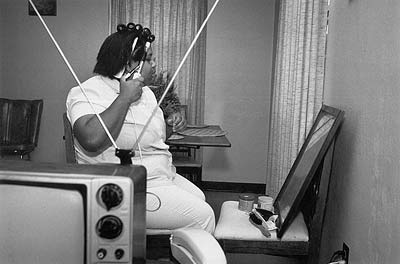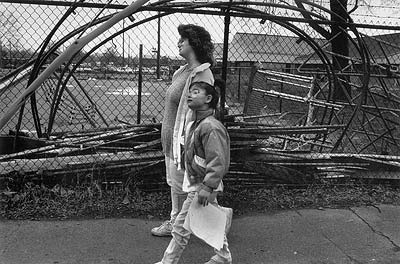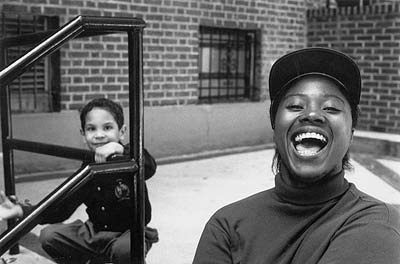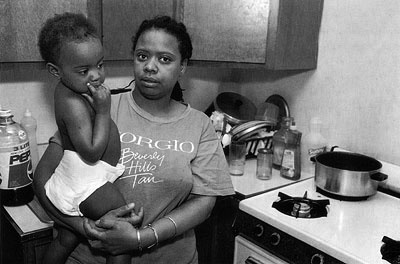This 32-page photo-essay profiles four families from Bronx, NY and Huntsville, AL and the case managers helping them gain better futures. Supported by The National Center on Family Homelessness and United Way of America, this publication was used for public education and fundraising purposes including distribution to all members of Congress. 1993.
The following text and photographs are excerpts from “Changing the Odds”.

Roshawnda
One evening last spring, Roshawnda opened her apartment door and was confronted with a burst of flame. “This guy had a spray can, and a lighter that he was holding up to the can,” says Roshawnda. “The fire was shooting out, and it shot across my face.”
The stranger responded to her request to leave by shouting “You can’t make me get off this f—-cking porch, bitch.” Roshawnda threatened to call the police and punched back at him when he attacked her. Pulled inside by a relative, Roshawnda dialed 911; meanwhile the man broke all the windows of her home and smashed the windshiled of her car. The police responded slowly and refused to get out of their cruiser on arrival.
Such violence is not unusual at Roshawnda’s public housing project. Almost every night Roshawnda hears profanity, drug dealing, and gunshots through the thin walls of her living room. Recently she took her concerns to the head of Huntsville’s Housing Authority, who was sympathetic but said there was nothing he could do.

Melissa
Melissa’s two children, Patricia, 3, and Theresa,7, play a game that takes advantage of the empty space in their apartment. They lie on the bare floors, cheerfully arranging themselves in the shapes of various letters of the alphabet. The family’s spare furnishings make sounds and footsteps sound hollow. Theresa’s voice echoes as she calls out “X”!
During these games, Melissa, 27, sits impassively in her corner easychair. Depression saps her energy; she keeps her eyes down, her shoulders slumped, and her voice low. Melissa’s shyness does not prevent her from advocating for her children or working hard at her studies. Yet she often overlooks her strengths, dismissing the sound of her voice as “babyish,” or criticizing herself for forgetfulness. “I usually put myself down a lot,” says Melissa.
This apartment represents a beginning for Melissa. For the first time ever she has a place of her own and a plan for her life. “It’s perfect, I reckon,” says Melissa. “We’ve been living here and there with people.” In the past year, Melissa and her children have lived in eleven different locations.

Sandy
When Sandy spots an acquaintance she jumps on her radiator, leaning her entire upper body out of the fourth floor window. “Later this afternoon!” she yells, grinning and gesturing wildly. Sandy’s sense of humor and impetuous nature create an atmosphere of giddy possibility. She’s known for steak and ice cream breakfasts, as well as the chameleon quality of her plans.
Sandy rarely accepts advice, and gives it even less frequently. But on one topic she has strong opinions: how to treat mothers. “I get depressed when I see kids here, the way they be talking to their moms, cussing and saying anything. I’m saying in my mind, you don’t know it, but your mom is your greatest inspiration.”
Black moods descend on Sandy when she thinks about her life and her own mother, who died when she was ten. “I spend a lot of time alone, and don’t talk to anyone. A lot of people know the joking side, but I get very sad.”

Sara
Sara’s youngest child, Deidre, has caught a cold. Concerned about her daughter’s labored breathing, Sara searches her apartment for an aspirator, a plastic device used to clear congestion. She finds it after a harried search, and inserts it into Deidre’s small nose. However, instead of calmly suctioning out the child’s nose, Sara rapidly blasts air in both directions. Deidre’s wriggles and screams only drive Sara to intensify her efforts.
Sara cares deeply about being an effective parent, but at times she becomes frantic and overwhelmed. Sometimes she seems to burn with intensity, and when she speaks her eyes open wide, as though in shock. At other times she’s exhausted, and even sitting still becomes an effort. For Sara, the logistics of daily life are stressful and challenging. Routine tasks such as getting up and readying her boys for school are often beyond her.